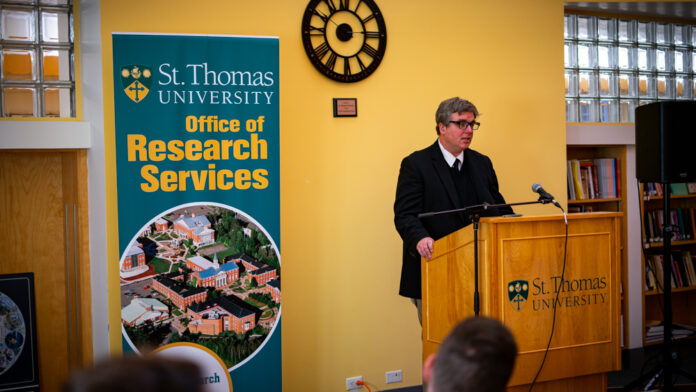

Conor Barry, a St. Thomas University political science professor, introduced his first book Paradigm, Logos, and Myth in Plato’s Sophist and Statesman on Sept. 29.
Faculty members gathered in Brian Mulroney Hall to celebrate 10 years of Barry’s writing and research. The book is about Plato’s later dialogues, The Sophist and The Statesman, in which he critiques some of his earlier, more well-known ideas.
Even though Barry has articles on Plato, the book is more about the general history behind the philosopher.
“Maybe some people find more recent things more interesting and this hopefully can help,” he said.
Barry first found an interest in Plato when he read the Republic and encountered all the discussions of what an utopia should look like. His fascination with philosophy only grew bigger as he studied Plato’s depiction of life through dialogue.
“Realizing, ‘Oh, yeah, the conversations I’m having with people echo the conversations on Plato’s dialogues and back and forth,’” he said. ”Art imitates life, life imitates art. That was an inspiring element.”
To Barry, his book is based on the notion of a paradigm that “is familiar to people for meaning, to form and play.”
“The sense of paradigm, to me, is not a reality that’s above, but a kind of concrete image that you can see and portray.”
He defined a paradigm as an image that allows us to see a different form of morality. He remarked that it is not just analogies, but can be used to depict mythological or dramatic figures, even Plato is considered a paradigm.
“There’s a logical component and an ethical component and a poetic component or mythological component, where all of them are integrated,” Barry said. “I liked the idea of doing something focused and narrow, but also it was fun to do something that was comprehensive.”
Barry said he found challenges along the way as he did not always agree with his advisor on the angle of the book.
“My advisor was very interested in mythology and I was more interested in metaphysics, but logical things. We sort of ended up incorporating all these different elements.”
Barry said that he had to wait six months for a committee in Ottawa. Even in moments of nervousness, Plato’s philosophy helped him keep composure.
“We like tragedy and comedy, but tragedy in particular, because it gratifies us, because it shows people lamenting, it shows heroes, in states of misfortune … that brings up wells of empathy, for the grief they’re experiencing,” he said.
Barry hopes to bring people to a more comprehensive view recognizing the impact of Plato’s work as a whole.
“Bring readers to their attention the importance of these later dialogues, in a way that kind of enhances their understanding of the sophistication of what Plato has actually undertaken.”
